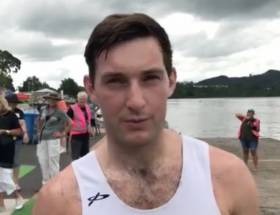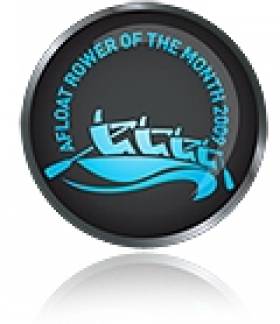Displaying items by tag: sculls
Paul O’Donovan won his heat of the Open single sculls at the Sydney International Regatta on Monday.
The Skibbereen oarsman finished more than 16 seconds ahead of second-placed Jack Hargreaves.
Gary O’Donovan finished eighth in his heat and must take on a repechage if he is to qualify for a semi-final.
#ROWING: The Afloat Rowers of the Month for May are Paul and Gary O’Donovan. The brothers from Skibbereen formed the Ireland lightweight double which finished fifth at the European Rowing Championships in Poznan in Poland. They produced a very good performance in their semi-final to take third and so qualify for the A Final. In that race, they won a battle for fifth with Turkey. The winning crew, France, produced a European best time. The lightweight double is an extremely competitive event, but the new Ireland crew has hit the ground running.
Rower of the Month awards: The judging panel is made up of Liam Gorman, rowing correspondent of The Irish Times and David O'Brien, Editor of Afloat magazine. Monthly awards for achievements during the year will appear on afloat.ie and the overall national award will be presented to the person or crew who, in the judges' opinion, achieved the most notable results in, or made the most significant contribution to rowing during 2015. Keep a monthly eye on progress and watch our 2015 champions list grow.
Irish Rowing News. Rowing Clubs, Regattas, Sculling & Coastal Rowing
Afloat's rowing coverage encompasses the widest range of activities undertaken on Irish lakes, rivers and coastal waters. We aim to bring jargon free reports separated in to popular categories to promote the sport in Ireland.
Click this link for the latest Irish Rowing News and Results.
Rowing is one of the oldest of all sports, and FISA (Federation des Societes d'Aviron) the governing body of the sport, which was founded in 1892, is the oldest international sports federation in the Olympic movement. FISA has 128 member federations worldwide, organises World and Olympic Championships and World Cups and promotes all forms of rowing – including the non-Olympic event of Coastal Rowing.
The Irish Amateur Rowing Union, a federation of rowing clubs, has a history almost as long as the international body: it was founded in Dublin in 1899. Now reconstituted as Rowing Ireland, in 2010 the union had 69 affiliated clubs spread throughout the island of Ireland and 2,500 registered athletes. The National Rowing Centre is based at Farran Wood on Inniscarra Lake in County Cork. The domestic season traditionally culminates in the National Championships in mid-July.
Rowing is divided into sweep rowing and sculling. Sweep rowing involves the participant using both hands on one oar; in sculling the participant holds one oar in each hand. Boats may include a cox (coxwain), who generally steers the boat by means of wires, and guides and rallies the crew. In the shorthand of the sport, coxless crews are denominated by a minus (e.g. a men's coxless four is M4-). Senior sculling crews generally do not include a cox. The set distance for competition in regattas is 2,000 metres. Six-lane racing is standard.
The Olympic Games are the highest level at which rowers compete: there are 14 Olympic rowing classes, eight for men and six for women. Only three of these are in the lightweight classification, the most successful one for Irish rowers: men's fours (LM4-) and double sculls (LM2x) and women's double sculls (LW2x).
Individual oarsmen in lightweight crews cannot exceed 72.5 kilograms, and the average weight of a lightweight crew, excluding the cox, cannot be over 70 kgs. A single sculler cannot be above 72.5 kgs. The equivalent for women are 59 kgs (highest weight) and 57 kgs (average for oarswomen in a crew).
Ireland's best results at the Olympic Games came in 1996 and 1976. At Lake Lanier in the 1996 Games the men's lightweight coxless four crew of Tony O'Connor, Neville Maxwell, Sam Lynch and Derek Holland were beaten by less than a second for the bronze medal. In 1976 in Montreal Sean Drea finished fourth in the men's single sculls. In 2004 the Ireland lightweight four finished sixth in Athens.
The annual World Rowing Championships feature the 14 Olympic events and eight others for able-bodied athletes along with four adaptive events. The Championships have been a much happier hunting ground for the Irish, especially in the non-Olympic events. Niall O'Toole won gold in the lightweight single scull in 1991 and in 2001 Ireland won three World Championship golds: Sam Lynch (lightweight single scull); Sinead Jennings (women's lightweight single) and Tony O'Connor and Gearoid Towey (lightweight pair). Lynch sucessfully defended his title in 2002.
After the Olympics and the World Championships, the third big rowing competition is the World Cup series, usually three regattas in Europe. The World Under-23 Championships, the World Junior Championships, and, for countries in these islands, the Home Internationals, are also big international events. The European Championships were revived in 2006 after a three-decade break and Ireland took part in 2010.
Henley Royal Regatta, with the finals in July each year in the English town, has a special place in the calendar due to its history and its social aspect.
Our coverage though is not restricted to the Republic of Ireland but encompass Northern Ireland Scotland, Wales and the Irish Sea area too.
We're always aiming to build on our rowing content. We're keen to build on areas such as online guides on rowing. If you have ideas for our pages we'd love to hear from you. Please email us at [email protected]






























































